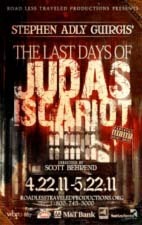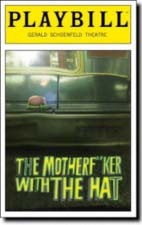 Stephen Adly Guirgis comes to Buffalo May 14 to attend a production of his play, The Last Days of Judas Iscariot, at the Road Less Traveled Theatre. Earlier that day, he’ll meet with local playwrights for an onstage interview and Q&A and after the show, he’ll attend a gala, along with Stephen McKinley Henderson, who originated the role of Pontius Pilate at the Public Theater in 2005. Stephen was kind enough to grant me an interview for Buffalo Spree in advance of his visit. He wasn’t yet a Tony nominee but I saw The Motherf**ker with the Hat two weeks ago, and the nomination is well-deserved!
Stephen Adly Guirgis comes to Buffalo May 14 to attend a production of his play, The Last Days of Judas Iscariot, at the Road Less Traveled Theatre. Earlier that day, he’ll meet with local playwrights for an onstage interview and Q&A and after the show, he’ll attend a gala, along with Stephen McKinley Henderson, who originated the role of Pontius Pilate at the Public Theater in 2005. Stephen was kind enough to grant me an interview for Buffalo Spree in advance of his visit. He wasn’t yet a Tony nominee but I saw The Motherf**ker with the Hat two weeks ago, and the nomination is well-deserved!

Here is the text of the article as it appears in this month’s issue of Buffalo Spree:
Caption:
Playwright Stephen Adly Guirgis celebrated his Broadway debut April 11 with The Motherf***er with the Hat. The title that has raised a few eyebrows, Guirgis concedes, but “it’s just the title. I get my titles from the dialogue, and just like The Last Days of Judas Iscariot felt right, this felt right. If [the producers] had shied away, I certainly would have considered calling it something else, but they seemed to embrace it.”
Stephen Adly Guirgis: the motherf***er with all the hats
by Donna Hoke
Even if you’ve never heard the name Stephen Adly Guirgis (and it’s a hard one to forget), you’ve no doubt heard of his work. He’s acted in Meet Joe Black, Synecdoche, New York, and TV’s “Law and Order.” He’s written for “NYPD Blue” and “The Sopranos.” He’s directed actors on New York City stages but, more notably, he’s put words in their mouths. As author of such critically acclaimed plays as Jesus Hopped the A Train and The Last Days of Judas Iscariot, Guirgis is best known as an award-winning playwright. And that’s the hat he’ll be wearing this month as a Road Less Traveled Productions’ American Theater Master.
Guirgis arrives in Buffalo fresh off his Broadway debut with The Motherf***er with the Hat, a play starring Chris Rock (in his Broadway debut) as an addict-turned-sponsor. The title is a departure, not just because of the obscenity but because many of Guirgis’ titles—even when the plays contain no less profanity—favor religious allusions taken from the script. “St. Paul said ‘When I became a man, I put away my childish things.’ If my plays have a common link, it’s people struggling to put away their childish things,” the playwright says. “Incorporating religion is a way to tell those stories because religion gives you a game plan to grow and mature. The new play is more secular but it struggles with those same questions.”
RLTP’s current production, The Last Days of Judas Iscariot—which depicts the trial that determined the title traitor’s fate—has at its heart a question that Guirgis struggled with since Catholic grammar school. “When they told us how Judas betrayed the savior and hung himself, I could not wrap my mind around [the idea that] if I could forgive someone, why couldn’t God? It arrested my spiritual growth, so with Judas, I thought ‘Let me start at the beginning where things first went haywire.’ And that was the play that really launched us.”
“Us” refers to LAByrinth Theater Company, an off-Broadway multi-cultural ensemble where Guirgis wears yet another hat as co-artistic director. The company encourages multi-disciplinary development, which is how Guirgis—at heart an actor—began writing. “They thought I was pretty good and they kept pushing me, so in the early stages, it was practically out of guilt that I wrote, and then at a certain point, I had to accept that I’m a writer,” Guirgis says. “I’m trying to balance the two, because even though acting is when I’m happiest, writing is where I feel more responsibility to get the most out whatever talent I was given, and what takes up more of my time and psyche.”
And takes more of a toll on his psyche. As Guirgis describes his writing process, it’s a downward-spiraling agony trip fueled by cigarettes and caffeine. “With acting, you have to go to rehearsal even if you don’t feel like going, but before you know it, the day is over, and you feel good,” he explains. “With writing, it’s just you. There’s a whole process of avoidance and procrastination and increasing anxiety. I isolate, I’m up all night so I’m groggy, I’m in my head a lot. It’s very similar to the major symptoms of depression, so often as the play gets better and better, my life goes in the toilet.”
With Judas, his first major work, Guirgis continued to self-flagellate after the mixed reviews came in, feeling as though he’d failed his company, himself, God. Then late one night, playwright John Guare (Six Degrees of Separation) phoned Guirgis at home to praise the play. And then other playwrights started calling. Even now, “I get the most emails, Facebook messages, packages, and photos about this play,” Guirgis marvels. “I’ve come to realize that this play being out in the world is a good thing; it has touched people, and my opinion is not relevant. What is relevant is what’s coming back to me.”
Through prayer, practice, and pure experience, Guirgis has made strides toward a healthier process and, with Hat, he made a promise: “I told myself I wasn’t going to prioritize the play over my well-being. So yes, I worked my ass off, but I also went to the gym, therapy, and did the things I needed to do to keep myself together. The image that writers have to be tragic and die with a bottle up their ass is nonsense. There’s been a lot of light in my life but also a lot of dark, and you either get better at balancing the two or you die. When I was teenager, I could drop a couple hits of acid and drink a case of beer and smoke a bag of weed and get up and go to work at seven a.m. In my twenties, I could smoke the weed and maybe be late for work. In your forties, it adds up. And you start thinking, if I’m going to be reckless, I want to be reckless in the direction of making work. So I guess my job until I start to suck is to keep writing. And to learn how to do that without killing myself.”